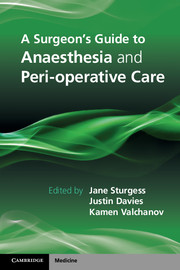Book contents
- Frontmatter
- Contents
- List of contributors
- Foreword
- Section I Basic sciences
- Section II Anaesthesia and peri-operative care for surgical specialties
- Chapter 7 Cardiothoracic cases
- Chapter 8 Colorectal cases
- Chapter 9 Upper gastrointestinal cases
- Chapter 10 Hepatobiliary and pancreatic cases
- Chapter 11 Endocrine cases
- Chapter 12 Vascular cases
- Chapter 13 Organ transplant cases
- Chapter 14 Otorhinology, head and neck cases
- Chapter 15 Paediatric cases
- Chapter 16 Plastic, reconstructive and cosmetic cases
- Chapter 17 Neurosurgery cases
- Chapter 18 Trauma cases
- Chapter 19 Orthopaedic cases
- Chapter 20 Urology cases
- Chapter 21 Bariatric cases
- Section III At a glance
- List of abbreviations
- Index
- References
Chapter 8 - Colorectal cases
Published online by Cambridge University Press: 05 July 2014
- Frontmatter
- Contents
- List of contributors
- Foreword
- Section I Basic sciences
- Section II Anaesthesia and peri-operative care for surgical specialties
- Chapter 7 Cardiothoracic cases
- Chapter 8 Colorectal cases
- Chapter 9 Upper gastrointestinal cases
- Chapter 10 Hepatobiliary and pancreatic cases
- Chapter 11 Endocrine cases
- Chapter 12 Vascular cases
- Chapter 13 Organ transplant cases
- Chapter 14 Otorhinology, head and neck cases
- Chapter 15 Paediatric cases
- Chapter 16 Plastic, reconstructive and cosmetic cases
- Chapter 17 Neurosurgery cases
- Chapter 18 Trauma cases
- Chapter 19 Orthopaedic cases
- Chapter 20 Urology cases
- Chapter 21 Bariatric cases
- Section III At a glance
- List of abbreviations
- Index
- References
Summary
There are three main groups of patients presenting for colorectal surgery – those with intractable severe inflammatory bowel disease (IBD), those with malignancy, and those with benign anorectal problems. This chapter will concentrate on the first two patient groups.
Enhanced recovery has become synonymous with improved outcomes, shortened hospital stay, and improved patient satisfaction. The vast majority of research on enhanced recovery started in colorectal surgery. Many of the practices in care pathways, anaesthetic technique and post-operative care have subsequently been adopted by other surgical specialties.
Pre-operative assessment – general considerations
Pneumoperitoneum
The majority of major abdominal and pelvic colorectal surgery is now performed laparoscopically or with laparoscopic assistance. All patients must be assessed to see if they will tolerate:
i. Pressure effects of a pneumoperitoneum
ii. Physiological challenges of a pneumoperitoneum
iii. Physiological effects of steep Trendelenburg position
Nutrition and electrolytes
All patients are at risk of malnutrition and electrolyte imbalance. Specialised dietetics advice, and involvement of gastroenterologists will avoid complications and improve post-operative recovery. The malnutrition can be chronic and requires careful management of the ‘starved’ individual to prevent re-feeding syndrome or liver failure with nitrogen overload.
Items to consider specifically are:
i. Potassium (diarrhoea and vomiting), causes cardiac rhythm problems
ii. Magnesium (malabsorption), causes cardiac rhythm problems and muscle weakness
iii. Sodium (if on i.v. replacement fluids or sodium-depleting drugs)
iv. Albumin (indicator of liver function, healing problems, infection risk), important when considering whether to restore intestinal continuity with an anastomosis
v. Liver function (alters drug metabolism)
- Type
- Chapter
- Information
- A Surgeon's Guide to Anaesthesia and Peri-operative Care , pp. 91 - 101Publisher: Cambridge University PressPrint publication year: 2014



